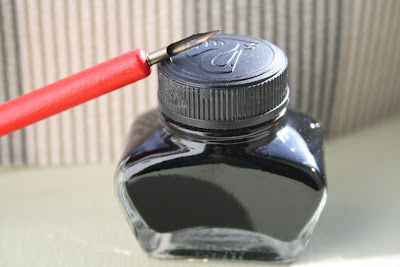 Over history the way we write, and therefore the way we think and communicate ideas, has changed - some would say it's more than changed, it's evolved. I'm not so sure technology serves us as well as we suppose.
Over history the way we write, and therefore the way we think and communicate ideas, has changed - some would say it's more than changed, it's evolved. I'm not so sure technology serves us as well as we suppose.Before any form of writing, people told stories and exchanged news orally. Since then there have been rapid developments: ink and scroll, printing press, typewriter, word processor (I'm sure there are some gaps in my small timeline). The idea behind each advancement is that we can speed up the process, and therefore improve it.
I'll concede the speed argument, but I'm not altogether sold on improvement.
If I had my way, I would hand write everything. As it is, I compose my blog posts on the computer, and most of my other writing is done by hand. I wrote my novel out by hand and I loved every slow moment. For poetry I certainly don't type, and sometimes I use 3X5 index cards per ten lines.
What I find is everything I write by hand is much more thought out, and much stronger. I generally fly through my blog posts, only to look at them later and bemoan their weaknesses. Of course, no matter how anyone composes there will always be that time of looking back and picking apart. But what would the world of books be like if every writer took the time to write out each word by hand? Even by typewriter?
I tend to think we'd have fewer and stronger books. More detail, more depth, more from each book.
The biography of C.S. Lewis I read a few weeks ago mentions that Lewis first used a quill and ink to write; it goes on to describe the time between each dip of the pen as a time for thought to germinate and develop. Talk about a slow process! Five to six words per dip! Imagine how long it would take to write out a first draft. Then a second and a third.
 |
| Someday I'd like to use this regularly |
But then imagine you had time to think through the first draft so well that the second or the third draft isn't all that necessary. Maybe. At least, at the very least, I believe writing by hand gives me the ability to escape into my new world that's springing up around me. The slow process, often interrupted with scratching out misspelled words or word changes, becomes part of what I look forward to experiencing.
I challenge you to try it. Write the next page of your current project on a good old piece of paper. Chances are you'll hate it, and it'll take much, much longer. Then again, you might just see some of your best writing in quite some time.
Fight the speed. There's nothing wrong with slow thinking, slow writing, or slowness at all.
2 comments:
Here's the problem I have with composing on paper...my thoughts are faster than my fingers and when I try to 'rewind' I forget what I first thought. lol. Did you understand that? Here's my fear with the future of 'writing' and it concerns our kids'; hence, our future generation. They are avid in textese, but less fluent in compcsing a paragragh without the assistance of a computer. They are our future 'leaders'...
I hear you. Once you've written with word processing, it's very difficult to go back. But I still contend that if you worked at it, and were able to slow even your thinking, that you'd be better off - that we'd all be better off if we could "revert" to that process.
One of my fellow teachers deals with this problem as well; if her students can't use a computer, and can't stick with an idea long enough, they give up. It's not so much that they can't write on paper, because I have some of the same students who hand write for me, but they get frustrated much more easily.
It takes a lot of practice, and remember, writing is hard work!
Post a Comment